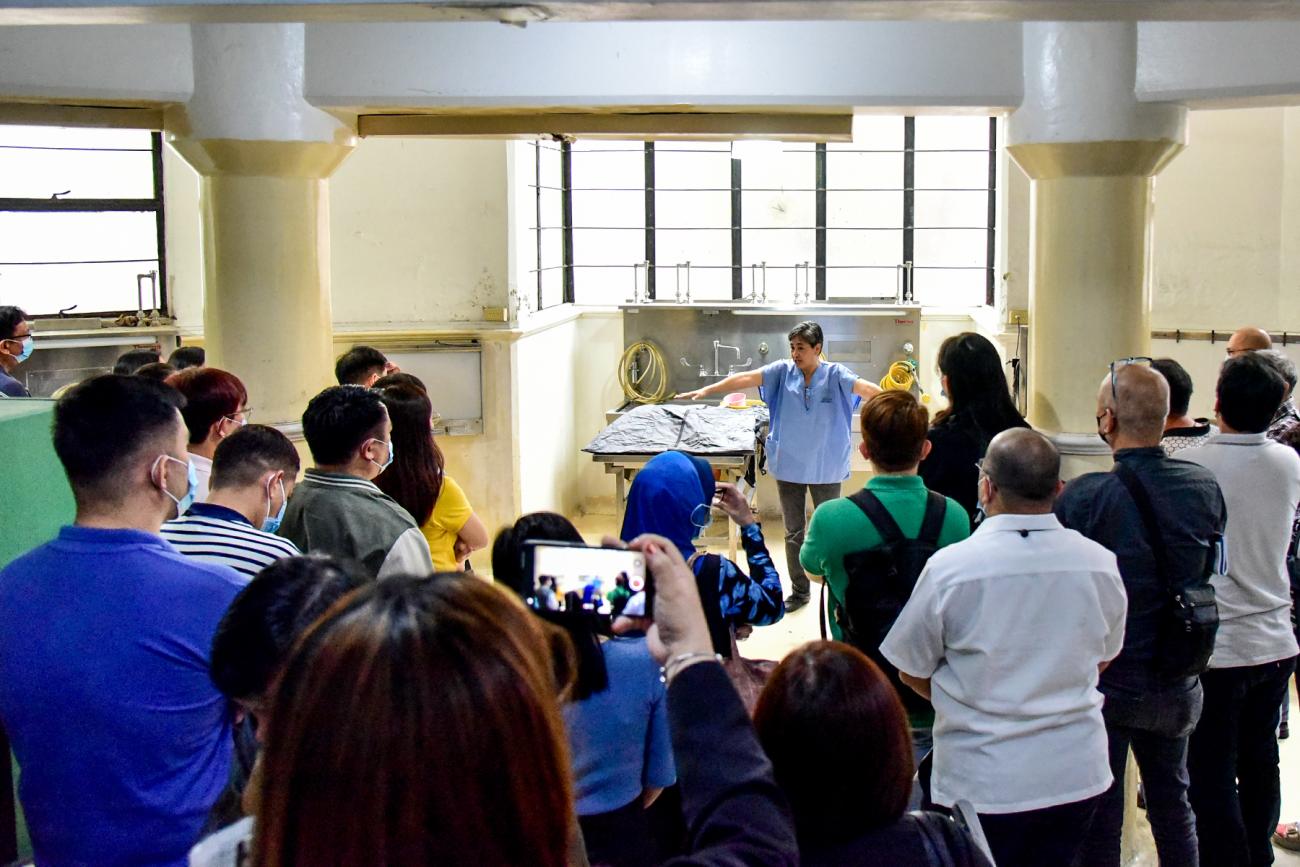Filipino experts learn to investigate suspicious deaths, compliance with key international protocol

The UN Joint Programme on Human Rights in the Philippines has been working with government and civil society to boost the country's forensic capacities
Sheilamar Saliganan-Abadia, Assistant Prosecutor in Lapu-Lapu City, Cebu, has worked in the Philippine justice system for nearly two decades. Throughout her career, she has dealt with many cases involving suspicious deaths.
“Being a prosecutor for 16 years, I primarily relied on the Certificate of Death [in preparing cases for prosecution], but I realized that they are not really accurate all the time,” she said. “[Learning more about] autopsies made me realize that.”
Ms Saliganan-Abadia was one of 42 law enforcement and justice sector personnel trained on guidelines called the Minnesota Protocol in a series of workshops organized by the United Nations Joint Programme on Human Rights (UNJP-HR).
The Minnesota Protocol on the Investigation of Potentially Unlawful Death is an internationally recognized practical guide for police, crime scene investigators, medical practitioners, lawyers, and others tasked with investigating suspicious deaths.
Originally conceived by the Minnesota Lawyers International Human Rights Committee in the 1980s, the Protocol was formally adopted by the United Nations in 1991 and revised in 2016. It sets standards and details procedures for collaborative forensic investigations that effectively respond to and ensure accountability for violations of the right to life.
To boost knowledge and use of the Protocol in the Philippines, the UNJP-HR, led by the United Nations Office of the High Commissioner for Human Rights (OHCHR), has been working with the Philippine government and civil society organizations to enhance collaboration among investigating agencies and strengthen forensic capacity.
In 2023 and 2024, five training workshops, including trainings of potential trainers on the Minnesota Protocol, were held for representatives of the Philippine National Police (PNP), the National Bureau of Investigation (NBI), the Department of Justice (DOJ), the Commission on Human Rights (CHR) and civil society actors and academics.
International and national forensic experts from the medical, legal and investigation fields led and facilitated interactive sessions on crime scene investigations, interviews of suspects and witnesses, the excavation of graves, post-mortem examinations, and the analysis of skeletal remains.
Since taking part in the training, Ms Saliganan-Abadia has worked to cascade the lessons she has learned to other government officials in Cebu and the rest of the Western Visayas region.
“The Minnesota Protocol builds on best international practice and is considered the ‘gold standard’ when it comes to investigations,” said Signe Elneff Poulsen, UN Philippines’ Human Rights adviser who is at the helm of the UNJP-HR. “These workshops develop skills and provide opportunities to discuss how to consistently apply the Protocol. Including government actors with different roles and civil society strengthens mutual understanding and builds trust—critical when these skills are applied in the field. That is why all our workshops focus on practical application.”
To facilitate the implementation of the Protocol, the UNJP-HR organized a study visit of Philippine officials to Argentina for a knowledge exchange on investigations of potentially unlawful deaths as a part of South-South and Triangular Cooperation on strengthening forensic capacity in the country.
‘South-South cooperation’ refers to the collaboration and exchange of resources, technology, and skills between developing countries in the Global South. Meanwhile, triangular cooperation also involves technical cooperation between two developing countries, facilitated by multilateral organizations like the United Nations.
The study visit to Argentina by representatives of the Medico-Legal Divisions of the PNP and NBI is an example of this kind of cooperation. It provided an opportunity for Filipino law enforcement and investigations officials to engage with and learn from counterparts in Buenos Aires.
In June 2024, a delegation of five Filipinos met with key officials from Argentina’s Ministry of Foreign Affairs, International Trade and Worship, Ministry of Justice, the Directorate of Human Rights and the Ministry of Security.
They also visited the laboratories and facilities of the Argentine Team of Forensic Anthropology, the Forensic Genetics Laboratory of Gendarmería Nacional, the Forensic Medicine Laboratory of the National Police, and the National Bank of Forensic Data, among other sites, to learn their best practices and the sustainability of their human rights efforts.
Police Major Pete Malino, a PNP medical doctor who has been serving as a resource person for government agencies, particularly the DOJ, for forensics training using the OHCHR methodology, was one of the delegates.
“It’s amazing how Argentina prioritizes forensic investigation, which can be shown in their advanced forensic lab and equipment," he said.
The visit served as both an opportunity for learning exchange and a pioneering example of triangular cooperation between the governments of the Philippines and Argentina, facilitated by the United Nations.
Highlighting the importance of such exchanges, Ricardo Luis Bocalandro, Argentina’s Ambassador to the Philippines said: “We believe that South-South cooperation between Argentina and the Philippines plays an important role in fostering mutual understanding, collaboration, and development between the two nations. In our recent joint activity, by sharing knowledge, resources, and best practices, both countries leveraged their strengths and expertise. The United Nations played a key role in facilitating and supporting this activity by providing a platform for dialogue, coordination and partnership.”
United Nations Philippines Resident Coordinator Gustavo Gonzalez echoed the sentiment: “The series of trainings on the Minnesota Protocol is an example of how multilateral partnerships yield results that go beyond the impact in one country, and where one country’s leadership contributes to regional and even global progress in the implementation of standards.”
For the Philippine government, the study visit is an important stepping stone towards a key priority in strengthening the justice sector.
“Under the UNJP, we sent five medico-legal doctors to Argentina for a study visit on forensic science—another step for us to increase our competency on this matter and help establish a national forensic institute in the country,” said Justice Undersecretary Jesse Andres.
But for Ms Saliganan-Abadia and Dr. Malino, furthering their knowledge on the Minnesota Protocol is a big step forward in ensuring more efficient and collaborative investigations into potentially unlawful deaths as part of their efforts and advocacies to attain justice for victims and their families.
Written by




